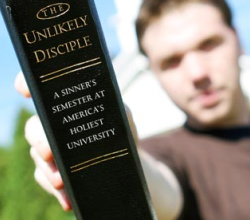 Kevin Roose. The Unlikely Disciple: A Sinner’s Semester at America’s Holiest University. Grand Central Publishing, 2009. ISBN: 9780446178426.
Kevin Roose. The Unlikely Disciple: A Sinner’s Semester at America’s Holiest University. Grand Central Publishing, 2009. ISBN: 9780446178426.
Meet the Author
Kevin Roose is a senior at Brown University. His first book, The Unlikely Disciple: A Sinner’s Semester at America’s Holiest University (2009), was chosen for Barnes & Noble’s “Discover Great New Writers” series and an excerpt from it received Brown University’s 2009 Casey Shearer Memorial award for best non-fiction writing by an undergraduate. Kevin has been published in the Huffington Post, Brown Daily Herald, and Esquire. For more information, read Kevin’s blog, follow him on Twitter, watch a four minute book trailer on YouTube, or like the book on Facebook.
Book Basics
Kevin Roose was an aspiring writer studying at an Ivy League university when he first visited the Rev. Jerry Falwell’s Thomas Road Baptist Church as part of his work assisting the journalist A.J. Jacobs with his research for The Year of Living Biblically (2007). His post-trip fascination with the student culture led him to do more research on evangelical colleges and eventually birthed the idea of traveling “abroad” for a semester as a visiting student. After receiving some practical coaching from a friend who knew his current agnosticism and limited Quaker background were inadequate preparations for the task, Kevin transferred from Brown University to Liberty University and lived “undercover” as an evangelical undergraduate for the Spring 2007 semester. The book offers an honest, fresh, and objective look inside one of the most well known evangelical universities.
 The Unlikely Disciple is a must read for anyone who wants to know what life is really like at Liberty University or for those seeking to better understand American evangelicalism. Kevin’s experiences as a nineteen year old sophomore include living in a dorm, taking introductory classes, attending chapel, dating, singing in the Thomas Road Baptist Church choir, interviewing Rev. Falwell for the student paper, and learning to live according to a forty-six page code of conduct known as “The Liberty Way.” While he does report the oddities unique to the environment, such as being counseled not to masturbate or attending a spring break mission trip where he must witness to strangers in an attempt to “save” them, he focuses on providing an accurate understanding of the student culture. Kevin is pleasantly surprised to learn that the university is more academically rigorous than he anticipated and that most students are not as radically fundamental about their worldview as the media portrays. Though he does not convert to evangelical Christianity, Kevin does gain a new respect for those who affiliate with evangelical traditions and finds he now “believes in a divine presence more often than not” (p.282).
The Unlikely Disciple is a must read for anyone who wants to know what life is really like at Liberty University or for those seeking to better understand American evangelicalism. Kevin’s experiences as a nineteen year old sophomore include living in a dorm, taking introductory classes, attending chapel, dating, singing in the Thomas Road Baptist Church choir, interviewing Rev. Falwell for the student paper, and learning to live according to a forty-six page code of conduct known as “The Liberty Way.” While he does report the oddities unique to the environment, such as being counseled not to masturbate or attending a spring break mission trip where he must witness to strangers in an attempt to “save” them, he focuses on providing an accurate understanding of the student culture. Kevin is pleasantly surprised to learn that the university is more academically rigorous than he anticipated and that most students are not as radically fundamental about their worldview as the media portrays. Though he does not convert to evangelical Christianity, Kevin does gain a new respect for those who affiliate with evangelical traditions and finds he now “believes in a divine presence more often than not” (p.282).
So What?
In many cases one’s (mis)perception of the other becomes reality. When it comes to understanding religions other than one’s own, it is essential not to form opinions based on caricatures or data provided by those who are also not familiar with that faith. Recent research shows that Americans lack basic religious literacy. Local congregations should provide opportunities for learning using introductory resources like Stephen Prothero’s God is Not One: The Eight Rival Religions That Run the World – and Why Their Differences Matter (read my review here).
Kevin’s book serves as a powerful example of the difference between knowing about adherents of a given religion and developing relationships with those individuals. Additionally, he has launched something he is calling the Jonah Project, which seeks to give away 500 copies of The Unlikely Disciple to pairs of persons with differing religious perspectives who commit to read the book, engage in dialogue (discussion questions are provided), and share their experience. For more information, consider reading reflections and/or viewing videos from several pairs who have already participated.
When was the last time you talked with someone of another faith about religious matters? How will your congregation facilitate inter-religious dialogue and improve religious literacy in 2011?